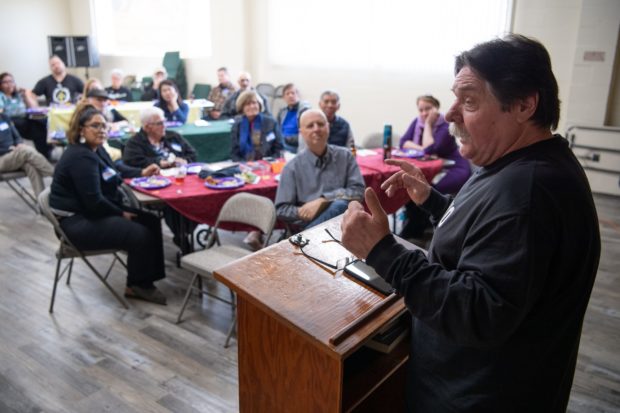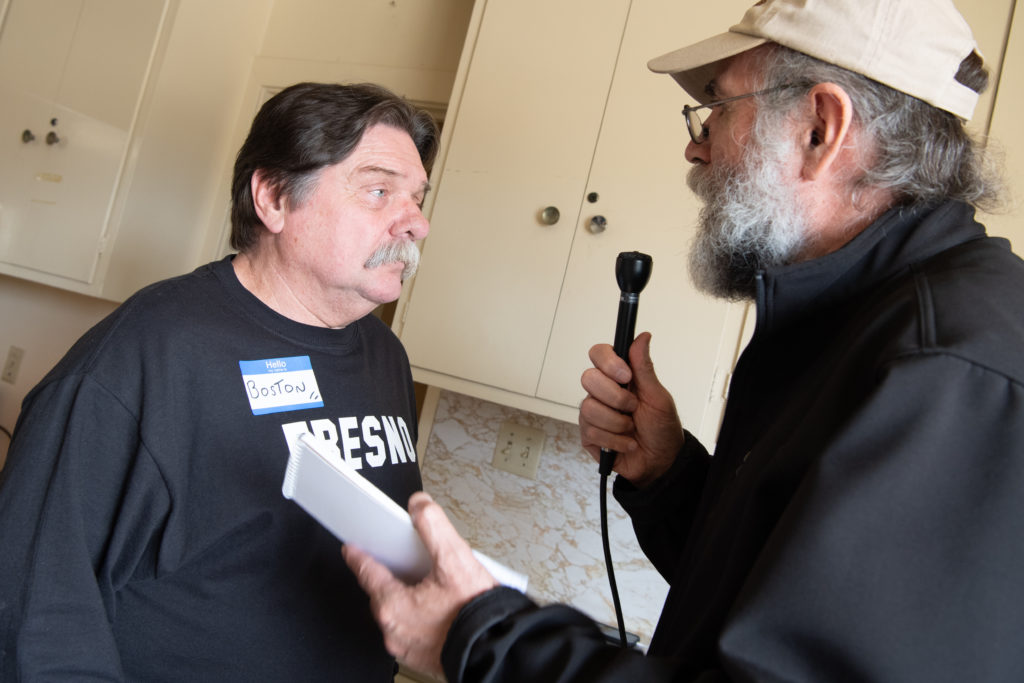
By Peter Maiden
“Wow man, I’m not surprised. But amazed!” Boston Woodard had been looking out the window of Mike Rhodes’ car at scores of homeless people passing the day in a southwest area of downtown Fresno. Rhodes is the most experienced reporter on homelessness in Fresno and was giving us a special tour.
It was extra-special in Woodard’s eyes—everything was new to him—as he just got free from being incarcerated for 38 years. He is well known for his regular column of prison journalism in the Community Alliance, although he had never been to Fresno before.
Driving around, we saw the Rescue Mission, a line for a free lunch and sheds with no water or heat where some of the homeless are placed. We also saw the building where Rhodes once had a print shop. It is now part of the headquarters of Fresno’s high-tech center Bitwise.
Showing us to an alley in the back, Rhodes said that was where he saw a homeless man being verbally abused by a bicycle cop, who called the man a “dirty bum” and told him to “get a job.” That was the beginning of a consuming interest for Rhodes, which culminated in the publication of his book Dispatches from the War Zone: Homelessness in Fresno 2012–2015.

We also paid a visit to Chukchansi Park. Woodard is a sports fan and admired the stadium. He and Rhodes posed for a photo at the gates.
Woodard also published a book, in 2011, called Inside the Broken California Prison System. It is a collection of pieces he wrote for the Community Alliance. After our tour, we went to a get-together at the Fresno Interdenominational Refugee Ministries (FIRM), where Woodard met with Community Alliance staff, board members and supporters.
Addressing the group, Woodard said that he dropped out of school in the seventh grade. He said he was a “miscreant” growing up: “I never heard of the Boy Scouts, or the YMCA.” He was in a fatherless home after the age of 10. He hung out in the street and became a “thug in progress.” The police and the courts eventually wanted him off the streets.
Writing and music (he is an accomplished bassist) were the keys to Woodard keeping himself together and moving forward while in prison. He would write his sister, and she encouraged him, saying his letters were good and that he should write articles. He got involved with the San Quentin News in the mid-1980s.
He took GED classes and a UCLA creative writing correspondence course. Later, he ran a newspaper at Folsom. There’s a law that an inmate cannot publish falsehoods, making it a misdemeanor to stretch the truth, and Woodard said he never crossed that line.

Woodard did say that sometimes the word of a prison journalist is questioned on the basis solely of him or her being a convict. That wasn’t Rhodes’ sense of things, though. If anything, the contrary was true.
Rhodes was introduced to Woodard’s work by María Telesco, a prison activist. The Community Alliance had been giving free subscriptions to prisoners (for every subscriber in prison, there were 20–30 others who would go through a copy of the paper). Rhodes got some submissions from prisoners, but he said he read Woodard’s work and was positively inspired.
Rhodes thought, “Oh my god, somebody on the inside who could really write, and could tell the story of what’s going on inside the prison industrial complex.”
There was a price to pay for Woodard’s involvement with the press. On several occasions, he had his typewriter taken away. Other times, he was taken to solitary confinement, and he was told it was because of what he had written—even if what he had written was true.
His release was delayed in 2017 as he had to go to Massachusetts to serve time on a charge pre-dating the charges that landed him in prison in California, which a court “discovered” most likely because of his high profile as a journalist.
As fate would have it, Woodard will no longer have to endure such punishments. He has an affordable place to stay in San Jose in a group home and is hopeful he can find employment and move out on his own after a while. The small crowd at FIRM showed their appreciation by passing the hat and purchasing a stack of his books, which he signed.
Reflecting on his visit to Fresno, Woodard said, “My biggest impression about the people I met in Fresno is that they’re just genuine, sincere, good people. It shows on their faces, it shows in their actions, and it’s explained in their words. I love coming here, and I definitely want to come back.”
Woodard will return to Fresno in June for a Community Alliance fund-raiser.
*****
Peter Maiden is a staff photographer for the Community Alliance newspaper. He studied media at UC Berkeley. Contact him at maidenfoto1@gmail.com.
